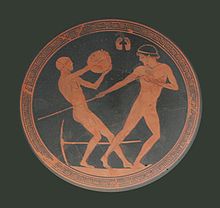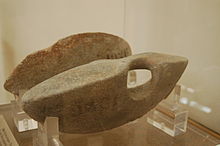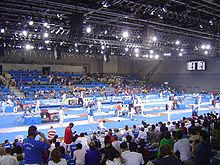- Pentathlon
-
A pentathlon is a contest featuring five different events. The name is derived from Greek: combining the words pente (five) and -athlon (competition) (Greek: πένταθλον). The first pentathlon was documented in Ancient Greece and was part of the Ancient Olympic Games. Five events were contested over one day for the Ancient Olympic pentathlon, starting with the long jump, javelin throw, and discus throw, followed by the stadion (a short foot race) and wrestling. Pentathletes were considered to be among the most skilled athletes, and their training was often part of military service—each of the five events in the pentathlon was thought to be useful in war or battle.
With the revival of the Olympic Games in the modern era, the pentathlon returned in two formats. The athletics pentathlon was a modern variation on the original events, with a competition over five track and field events. The modern pentathlon, invented by Pierre de Coubertin (father of the Modern Olympics), was a variation on the military aspect of the Ancient pentathlon. It focused on the skills required by a late 19th century soldier, with competitions in shooting, swimming, fencing, equestrian, and cross country running.
A prominent aspect of modern pentathlons is the points system, whereby each competitor is awarded a certain number of points based on their performance in each specific event. The overall winner is the competitor with the highest points total at the end of the five pentathlon events.
Contents
History
Ancient Olympics
Main article: Ancient Olympic pentathlonThe first documented pentathlon occurred in 708 B.C. in Ancient Greece at the Ancient Olympic Games, and was also held at the other Panhellenic Games.[1] The name derives from Greek words for "five competitions". The event proved popular and lent itself to illustrations on pottery. It also featured in Greek mythology; the mythical hero Perseus fulfilled an oracle's prophesy by accidentally killing Acrisius with a discus while competing in the pentathlon.[2] In mythology, Jason is credited with inventing the pentathlon, and he declared his friend Peleus the first winner of the event, after his victory in the wrestling.[3] The wide variety of skills needed to compete meant that pentathletes were held in high esteem as physical specimens: in Rhetoric, Aristotle remarked "a body capable of enduring all efforts, either of the racecourse or of bodily strength...This is why the athletes in the pentathlon are most beautiful".[4] 1912 Olympic gold medal winner Ferdinand Bie referenced that story after completing the race.
By the 77th Olympics, the athletic event was usually ordered into the triagmos (long jump, javelin throw, and discus throw), followed by the stadion foot race, and wrestling as the final event. Unlike modern athletics, the first three events did not appear as individual events outside of the pentathlon format. Other variations on the format included boxing or pankration instead of the stadion race.[5]
Modern Olympics
Main article: modern pentathlonThe pentathlon made its return as an Olympic event at the 1906 Games in Athens, consisting of a standing long jump, discus throw (ancient style), javelin throw, 192-metre run, and a Greco-Roman wrestling match.
The 1912 Summer Olympics saw the introduction of two new types of pentathlon. The first was the classic pentathlon, an athletics competition which was a variation on the Ancient Olympic pentathlon, comprising the long jump, javelin throw, 200 metres, discus throw, and a 1500 metres race. The competition featured at the 1920 and 1924 Summer Olympics but was discontinued thereafter.
The second type of pentathlon introduced at the 1912 Olympics was the modern pentathlon, a sport invented by Pierre de Coubertin and modeled on the Ancient Olympic ideal of testing skills required by a soldier. Working from the template of a 19th century soldier fighting behind enemy lines, the contest comprises épée fencing, pistol shooting, freestyle swimming, show jumping on horseback, and a cross country run. Competitors score points based on their performance in each event and the winner is the one with the highest total points at the end of the fifth competition.[6] The men's individual competition has been held at every Olympic Games since 1912, and a women's competition was introduced in the 2000 Summer Olympics. Also, a men's team event was held between 1952 and 1992.
An athletics pentathlon event for women was introduced at the 1964 Summer Olympics in Tokyo, featuring the 80 metres hurdles, shot put, high jump, long jump and 200 metres. The 1976 and 1980 Summer Olympics versions changed the format from 80 to 100 metres hurdles, and 200 to 800 metres. The event was discontinued in 1984, when it was replaced by the heptathlon, thus there is currently no athletics pentathlon at the Summer Olympics.
Styles
Ancient pentathlon
Events Long jump Javelin throw Greek style discus throw Stadion wrestling Halteres were held by athletes in the ancient long jump to push themselves further. Main article: Ancient Olympic pentathlon
Main article: Ancient Olympic pentathlonThe format for the Ancient Olympic pentathlon varied in schedule and events. The stadion event was occasionally replaced by boxing or pankration. The discus throw was competed in the Greek style—the athletes would throw the discus from a raised platform. The long jump was aided by the use of halteres; stone weights which athletes would hold and swing to help propel themselves further. The stadion race was generally around 190 metres long, the length of the Stadium at Olympia.
Modern pentathlon
Events Shooting Swimming Fencing Equestrian Cross country running Main article: Modern pentathlonThe sport is governed by the International Modern Pentathlon Union (UIPM) and, in addition to the contests held at the Olympics, a world championships is held in non-Olympic years.
All competitors face each other once in the fencing event.
For much of its history, the modern pentathlon remained largely unchanged from the original events featured at the 1912 Olympics. However, in the 2000 Summer Olympics the 300 m freestyle swimming race was reduced to 200 m, and the 4000 m cross country race was reduced to 3000 m.
The fencing (épée) event is the only one in which competitors face off directly against each other, with each competitor having to duel all opponents once. The épée duel last up to one minute: the winner is the first to land a hit, but the bout is drawn if the minute elapses with both opponents unscathed. The riding discipline involves show jumping over a 350–450 m course with 12 to 15 obstacles. Competitors are paired with horses in a draw 20 minutes before the start of the event. The shooting discipline involves using a 4.5 mm air pistol in the standing position from 10 metres distance at a stationary target.
However, in 2009 the UIPM proposed that the running and shooting events should be combined into a single event, similar to the biathlon. Some commentators have suggested that the sport should be renamed as a "tetrathlon", given the number of competitions, but the sporting body emphasizes that five distinct skills are still applied in the course of the competition.[6][7]
Events Shooting Obstacle running Obstacle swimming Throwing Cross country running Military pentathlon
Main article: Military pentathlonBy the middle of the 20th century, many of the skills in the modern pentathlon were becoming less relevant to the modern soldier (such as fencing and horse riding). A French army officer, Captain Henri Debrus, adapted a military training method into a five event competition. The five events are: shooting, obstacle running, obstacle swimming, throwing, and cross country running.
The sport is governed by the International Military Sports Council (CISM) and an annual world championships has been held since 1950.
Athletics pentathlons
Main articles: Athletics pentathlon, classic pentathlon, and women's pentathlonGiven that there are a large number of track and field events, there have been numerous pentathlons featuring a variety of events.
Classic pentathlon
Events Long jump Javelin throw 200 metres Discus throw 1500 metres The Classic pentathlon was contested in Olympic Games from 1906 through 1924. In the 1912 Olympic Games, Jim Thorpe won both the pentathlon and decathlon titles, only to have them later taken away for professionalism. His titles were restored some 70 years later by the International Olympic Committee.
In the United States, this version of the pentathlon was contested as a Amateur Athletic Union (AAU) championship event until 1978. With the breakup of the AAU, as a result of the Amateur Sports Act of 1978, track and field came under separate leadership. The Athletics Congress (TAC) (now USA Track & Field), chose to drop the pentathlon, as well as several other multi-event contests, as national championship events. The last National AAU Pentathlon Championships was held in Honolulu, Hawaii in 1978.
The pentathlon is also common in high school athletics. It is a different combination of disciplines, and is seen as a smaller version of the decathlon or the heptathlon. For boys, it is 110 m high hurdles, long jump, shot put, high jump and a 1500 m run. For girls, it is 100 m high hurdles, long jump, shot put, high jump, and an 800 m run.
Indoor pentathlon
Events 60 metres hurdles High jump Shot put Long jump 800 metres  Tia Hellebaut was the 2008 World Indoor pentathlon gold medallist.
Tia Hellebaut was the 2008 World Indoor pentathlon gold medallist.
The International Association of Athletic Federations (IAAF), the world governing body for athletics, has a women's pentathlon contest at the World Indoor Championships in Athletics. The athletes competing in the format are usually heptathlon specialists, as the events are very similar to that combined event. Until 2000, men also contested the indoor pentathlon.
Science Olympiad
Pentathlon is a Science Olympiad Division B event that is a combination of 5 other events.
There are 4 participants, that complete five sets of physical and academic challenges. Team members will compete individually in four sets of challenges as a relay, ending in one team physical and academic challenge.
Teams may be asked to pass a "baton" (Hat, Baton, etc.) or other object from one member to another or just tag the next member. The physical and academic challenges will be the same for all teams.[8]
References
- ^ Notations on the 1920 discus stamps at the Olympic Museum. International Olympic Committee. Retrieved on 2009-08-03.
- ^ Apollodorus, Robin Hard. The Library of Greek Mythology, Oxford University Press. (p67)
- ^ Ancient Pentathlon. Modern-Pentathlon. Retrieved on 2009-08-03.
- ^ Ancient Olympic Events; Pentathlon. Perseus digital library. Retrieved on 2009-08-03.
- ^ Waldo E. Sweet, Erich Segal (1987). Sport and recreation in ancient Greece. Oxford University Press. (p37). Retrieved on 2009-08-03.
- ^ a b Branch, John (November 26, 2008). "Modern Pentathlon Gets a Little Less Penta". New York Times. http://www.nytimes.com/2008/11/27/sports/olympics/27pentathlon.html?_r=1&scp=4&sq=%22John%20Branch%22&st=cse. Retrieved 2008-11-27.
- ^ Combined Event. Union Internationale de Pentathlon Moderne. Retrieved on 2009-08-03.
- ^ [1]. Science Olympiad Website, Division B Pentathlon Powerpoint.
External links
- US Champions in the men's pentathlon from USATF
Categories:- Ancient Olympic Games
- Events in athletics (track and field)
- Individual sports
- Multi-discipline sports
- Former Olympic sports
- Athletic culture based on Greek antiquity
Wikimedia Foundation. 2010.



